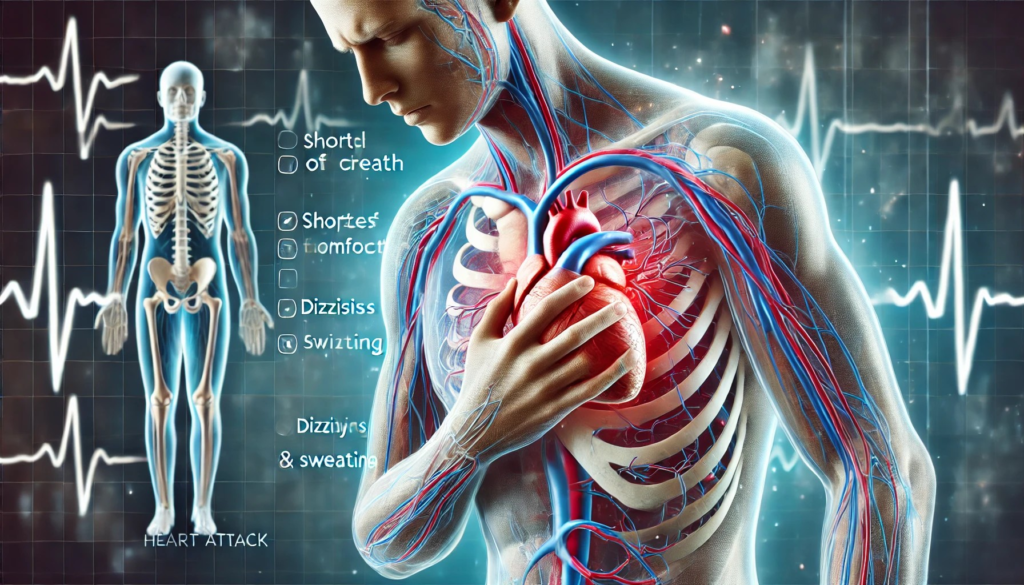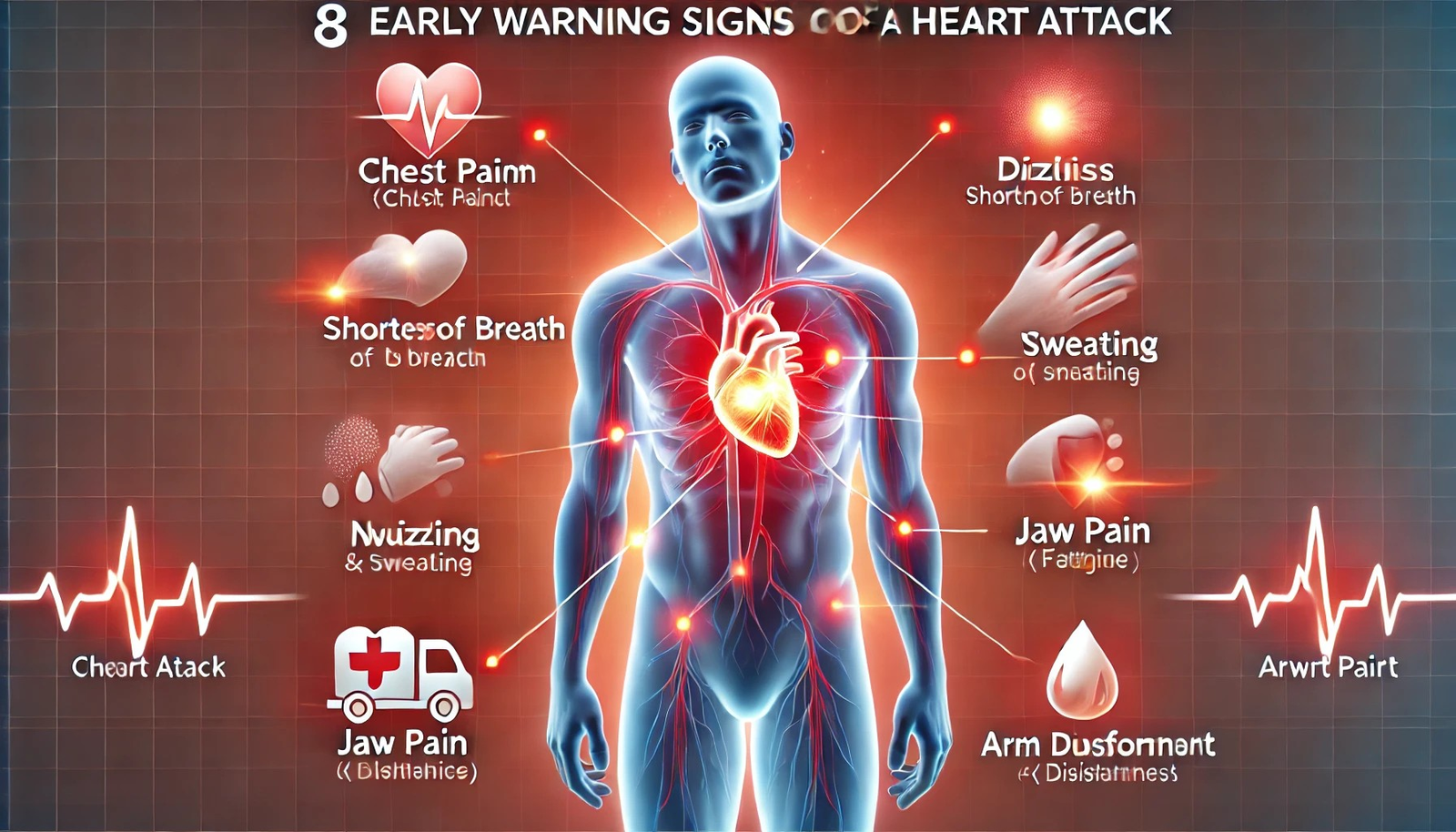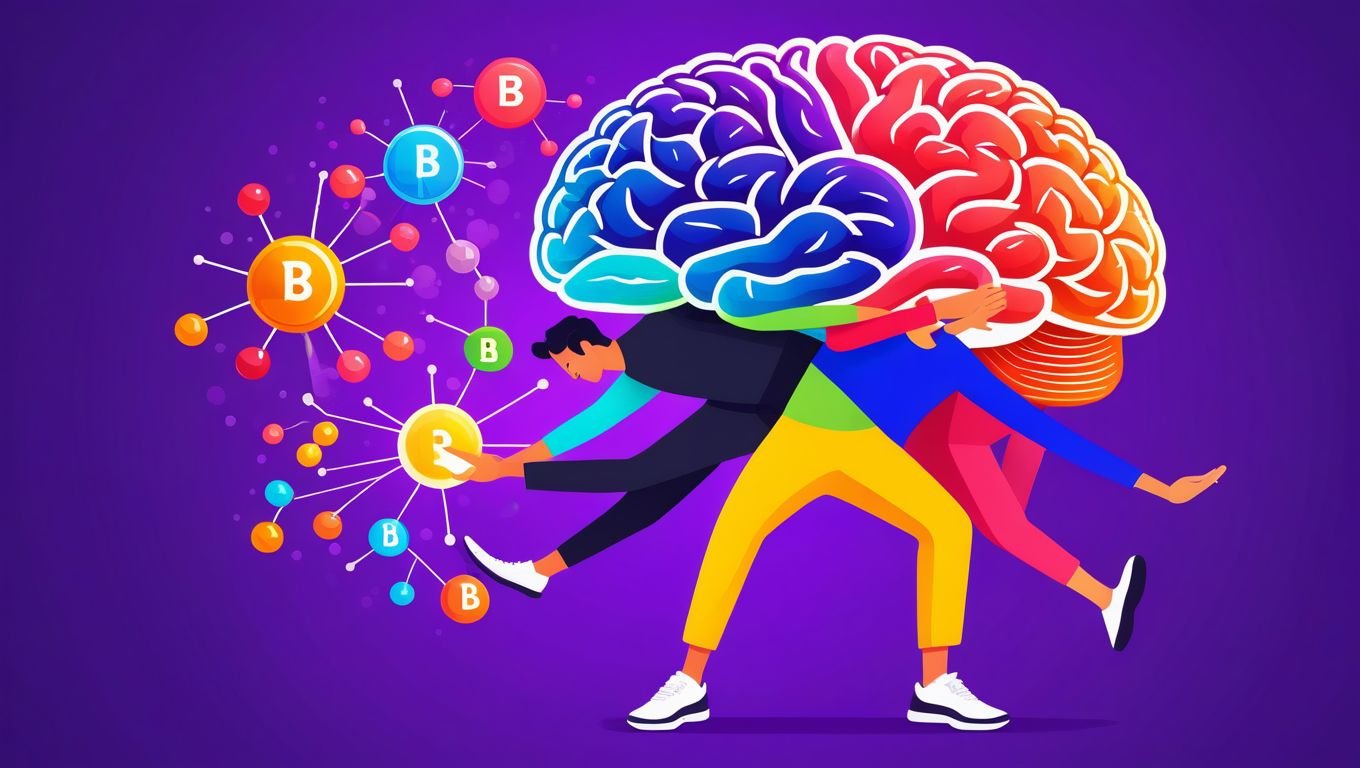Heart attack warning signs can appear early! Discover 8 frightening clues your body gives before a heart emergency.”

Introduction:
A heart attack is a life-threatening event that requires immediate medical attention. Recognizing the warning signs your body sends can save your life or the life of someone you love. In this comprehensive article, we’ll explore 8 frightening clues your body warns you about a heart attack, along with actionable steps to reduce your risk and protect your heart health.
Why Recognizing Heart Attack Clues is Crucial
Heart attacks are a leading cause of death worldwide. Early detection and intervention can significantly improve outcomes. Unfortunately, many people ignore or misinterpret the warning signs, delaying critical treatment. Understanding these clues can help you act quickly and potentially save a life.
A heart attack is a medical emergency that occurs when blood flow to the heart muscle is blocked, often due to a blood clot or plaque buildup in the coronary arteries. Recognizing the warning signs your body sends can save your life or the life of someone you love. In this section, we’ll dive deeper into the first three frightening clues your body warns you about a heart attack: chest pain or discomfort, shortness of breath, and pain radiating to the arm, neck, or jaw.
1. Chest Pain or Discomfort
What It Feels Like
Chest pain or discomfort is one of the most common and recognizable symptoms of a heart attack. It can manifest as:
- Pressure: A heavy, squeezing sensation in the chest, as if an elephant is sitting on your chest.
- Tightness: A feeling of constriction or tightness in the chest area.
- Burning: A burning sensation, often mistaken for heartburn or indigestion.
- Aching: A dull, persistent ache in the center or left side of the chest.
The pain may come and go or remain constant. It is often described as “uncomfortable” rather than sharp or stabbing.
Why It Happens
Chest pain during a heart attack occurs because the heart muscle is not receiving enough oxygen-rich blood. This is usually due to:
- Blocked Arteries: Plaque buildup (atherosclerosis) or a blood clot in the coronary arteries restricts blood flow.
- Ischemia: Reduced blood flow causes the heart muscle to become starved of oxygen, leading to pain.
- Stress on the Heart: The heart works harder to pump blood, increasing the demand for oxygen.
Action
If you experience chest pain or discomfort that lasts more than a few minutes, seek immediate medical attention. Do not wait to see if the pain subsides. Call emergency services or go to the nearest hospital. Early intervention can prevent permanent heart damage and save your life.
2. Shortness of Breath
What It Feels Like
Shortness of breath, or dyspnea, is another common warning sign of a heart attack. It can feel like:
- Difficulty Breathing: Struggling to take deep breaths or feeling like you can’t get enough air.
- Rapid Breathing: Breathing faster than usual, even at rest.
- Gasping for Air: Feeling like you need to gasp or pant to breathe.
- Tightness in the Chest: A sensation of heaviness or tightness that makes breathing difficult.
This symptom may occur with or without chest pain and can happen during physical activity or while resting.
Why It Happens
Shortness of breath during a heart attack occurs because:
- Fluid Buildup in the Lungs: When the heart struggles to pump blood effectively, fluid can back up into the lungs, a condition called pulmonary edema.
- Reduced Oxygen Supply: The heart’s inability to pump blood efficiently reduces oxygen delivery to the body, including the lungs.
- Increased Heart Strain: The heart works harder to compensate for reduced blood flow, leading to fatigue and breathlessness.
Action
If you experience sudden or severe shortness of breath, especially if it’s accompanied by other heart attack symptoms, call emergency services immediately. Do not attempt to drive yourself to the hospital. Quick medical intervention is crucial to prevent complications like heart failure or cardiac arrest.
3. Pain Radiating to the Arm, Neck, or Jaw
What It Feels Like
Pain or discomfort that radiates to other parts of the body is a classic sign of a heart attack. It can feel like:
- Arm Pain: A dull ache, heaviness, or numbness in the left arm (sometimes the right arm).
- Neck Pain: A sharp or squeezing pain in the neck, often mistaken for muscle strain.
- Jaw Pain: Aching or discomfort in the jaw, especially the lower jaw, which may feel like a toothache.
- Back Pain: Pain between the shoulder blades or in the upper back.
The pain may come and go or persist, and it often accompanies chest discomfort.
Why It Happens
Radiating pain occurs because:
- Referred Pain: The heart shares nerve pathways with other parts of the body, such as the arms, neck, and jaw. When the heart is in distress, the brain may interpret the pain as coming from these areas.
- Nerve Signals: Reduced blood flow to the heart irritates the nerves, sending pain signals to other regions.
- Muscle Strain: The heart’s struggle to pump blood can cause secondary muscle tension, leading to pain in the neck, jaw, or back.
Action
If you experience pain that radiates to your arm, neck, jaw, or back—especially if it’s accompanied by chest pain or shortness of breath—seek immediate medical attention. Do not dismiss it as muscle strain or indigestion. Early treatment can prevent further damage to the heart muscle.
Why These Symptoms Should Not Be Ignored
Ignoring these warning signs can lead to:
- Severe Heart Damage: Delayed treatment can cause irreversible damage to the heart muscle.
- Heart Failure: Reduced heart function can lead to fluid buildup in the lungs and other organs.
- Cardiac Arrest: A heart attack can trigger sudden cardiac arrest, which is often fatal without immediate intervention.
- Death: Early recognition and treatment are critical for survival.
What to Do If You Experience These Symptoms
- Call Emergency Services: Do not wait to see if the symptoms subside. Call for help immediately.
- Chew Aspirin: If recommended by a healthcare professional, chew an aspirin to help prevent further blood clotting.
- Stay Calm: Sit or lie down in a comfortable position and try to remain calm while waiting for help.
- Inform Someone: Let someone nearby know about your symptoms in case you need assistance.
4. Nausea, Vomiting, or Indigestion
What It Feels Like
Nausea, vomiting, or indigestion during a heart attack can feel like:
- Upset Stomach: A general feeling of discomfort or unease in the stomach.
- Nausea: A sensation of wanting to vomit, often accompanied by dizziness.
- Vomiting: Actual expulsion of stomach contents, which may or may not provide relief.
- Indigestion: A burning or gnawing sensation in the upper abdomen, often mistaken for acid reflux or heartburn.
These symptoms may occur suddenly and without an obvious cause, such as food poisoning or a stomach virus.
Why It Happens
Nausea, vomiting, or indigestion during a heart attack occurs because:
- Reduced Blood Flow to the Digestive System: When the heart struggles to pump blood effectively, the digestive system may not receive enough oxygen-rich blood, leading to discomfort.
- Vagus Nerve Stimulation: The vagus nerve, which connects the heart and digestive system, can become irritated during a heart attack, causing nausea and vomiting.
- Stress Response: The body’s stress response to a heart attack can trigger gastrointestinal symptoms.
Action
If you experience nausea, vomiting, or indigestion—especially if it’s accompanied by other heart attack symptoms like chest pain, shortness of breath, or radiating pain—be cautious and seek medical attention immediately. Do not dismiss these symptoms as a minor stomach issue. Early intervention can prevent further damage to the heart.
5. Cold Sweats
What It Feels Like
Cold sweats during a heart attack can feel like:
- Sudden Sweating: Breaking out into a sweat without physical exertion or heat.
- Clammy Skin: Skin that feels cold, damp, and sticky to the touch.
- Chills: A feeling of being cold despite the sweating.
These symptoms often occur suddenly and may be accompanied by other signs of a heart attack, such as chest pain or shortness of breath.
Why It Happens
Cold sweats during a heart attack occur because:
- Stress Response: The body releases stress hormones like adrenaline, triggering sweating as part of the “fight or flight” response.
- Reduced Blood Flow: The heart’s inability to pump blood effectively can cause the body to go into shock, leading to cold sweats.
- Pain and Discomfort: The intense pain and discomfort of a heart attack can activate the body’s stress response, resulting in sweating.
Action
If you experience sudden, unexplained cold sweats—especially if they are accompanied by other heart attack symptoms—seek medical help immediately. Do not ignore this symptom, as it can be a sign of a serious cardiac event.
6. Fatigue or Weakness
What It Feels Like
Fatigue or weakness during a heart attack can feel like:
- Extreme Tiredness: Feeling overwhelmingly tired, even after minimal physical activity or rest.
- Weakness: A lack of strength or energy, making it difficult to perform simple tasks.
- Heaviness: A sensation of heaviness in the limbs or body, as if moving requires extra effort.
This fatigue is often sudden and unexplained, unlike the tiredness that follows physical exertion or lack of sleep.
Why It Happens
Fatigue or weakness during a heart attack occurs because:
- Reduced Oxygen Supply: The heart’s inability to pump blood effectively reduces oxygen delivery to the muscles and tissues, leading to fatigue.
- Heart Strain: The heart works harder to compensate for reduced blood flow, causing exhaustion.
- Stress on the Body: The body’s stress response to a heart attack can drain energy reserves, resulting in weakness.
Action
If you experience sudden, unexplained fatigue or weakness—especially if it’s accompanied by other heart attack symptoms like chest pain, shortness of breath, or nausea—pay attention and seek medical attention immediately. Do not dismiss it as normal tiredness. Early diagnosis and treatment can save your life.
Why These Symptoms Should Not Be Ignored
Ignoring these warning signs can lead to:
- Severe Heart Damage: Delayed treatment can cause irreversible damage to the heart muscle.
- Heart Failure: Reduced heart function can lead to fluid buildup in the lungs and other organs.
- Cardiac Arrest: A heart attack can trigger sudden cardiac arrest, which is often fatal without immediate intervention.
- Death: Early recognition and treatment are critical for survival.
What to Do If You Experience These Symptoms
- Call Emergency Services: Do not wait to see if the symptoms subside. Call for help immediately.
- Chew Aspirin: If recommended by a healthcare professional, chew an aspirin to help prevent further blood clotting.
- Stay Calm: Sit or lie down in a comfortable position and try to remain calm while waiting for help.
- Inform Someone: Let someone nearby know about your symptoms in case you need assistance.
A heart attack is a medical emergency that occurs when blood flow to the heart muscle is blocked. While some symptoms, like chest pain, are well-known, others, such as dizziness and irregular heartbeat, can be subtle but equally critical. In this section, we’ll explore the final two warning signs of a heart attack: dizziness or lightheadedness and irregular heartbeat (arrhythmia). Understanding these symptoms can help you recognize a heart attack early and seek urgent medical care.
7. Dizziness or Lightheadedness
What It Feels Like
Dizziness or lightheadedness during a heart attack can feel like:
- Feeling Faint: A sensation that you might pass out or lose consciousness.
- Unsteadiness: Difficulty maintaining balance or feeling like the room is spinning.
- Lightheadedness: A floating or woozy sensation, often accompanied by blurred vision.
These symptoms may occur suddenly and without warning, especially when standing up or exerting yourself.
Why It Happens
Dizziness or lightheadedness during a heart attack occurs because:
- Reduced Blood Flow to the Brain: When the heart struggles to pump blood effectively, the brain may not receive enough oxygen, leading to dizziness.
- Drop in Blood Pressure: A heart attack can cause a sudden drop in blood pressure, reducing blood flow to the brain.
- Stress Response: The body’s stress response to a heart attack can trigger dizziness as part of the “fight or flight” reaction.
Action
If you experience sudden dizziness or lightheadedness—especially if it’s accompanied by other heart attack symptoms like chest pain, shortness of breath, or nausea—sit or lie down immediately and seek medical attention. Do not attempt to drive yourself to the hospital. Call emergency services for assistance.
8. Irregular Heartbeat (Arrhythmia)
What It Feels Like
An irregular heartbeat, or arrhythmia, during a heart attack can feel like:
- Palpitations: A sensation of your heart pounding, fluttering, or beating irregularly.
- Skipped Beats: Feeling like your heart has missed a beat or added an extra beat.
- Racing Heart: A sudden increase in heart rate, even at rest.
These symptoms may occur intermittently or persistently and can be accompanied by chest discomfort, dizziness, or shortness of breath.
Why It Happens
An irregular heartbeat during a heart attack occurs because:
- Electrical Disturbances: Reduced blood flow to the heart can disrupt its electrical system, causing irregular rhythms.
- Heart Muscle Damage: Damage to the heart muscle from lack of oxygen can interfere with its ability to maintain a regular rhythm.
- Stress on the Heart: The heart’s struggle to pump blood effectively can lead to arrhythmias.
Action
If you experience an irregular heartbeat—especially if it’s accompanied by other heart attack symptoms like chest pain, dizziness, or fatigue—monitor the symptoms and report them to your doctor immediately. In some cases, arrhythmias can lead to serious complications like cardiac arrest, so prompt medical evaluation is essential.
Why These Symptoms Should Not Be Ignored
Ignoring these warning signs can lead to:
- Severe Heart Damage: Delayed treatment can cause irreversible damage to the heart muscle.
- Cardiac Arrest: An irregular heartbeat can progress to sudden cardiac arrest, which is often fatal without immediate intervention.
- Stroke: Arrhythmias like atrial fibrillation can increase the risk of blood clots, leading to a stroke.
- Death: Early recognition and treatment are critical for survival.
What to Do If You Experience These Symptoms
- Call Emergency Services: Do not wait to see if the symptoms subside. Call for help immediately.
- Sit or Lie Down: If you feel dizzy or lightheaded, sit or lie down in a safe place to prevent falls or injuries.
- Chew Aspirin: If recommended by a healthcare professional, chew an aspirin to help prevent further blood clotting.
- Stay Calm: Try to remain calm while waiting for help. Anxiety can worsen symptoms.
- Inform Someone: Let someone nearby know about your symptoms in case you need assistance.
Conclusion
Dizziness or lightheadedness and irregular heartbeat are two frightening clues your body warns you about a heart attack. These symptoms, while less obvious than chest pain, are equally critical and should not be ignored. By recognizing these signs and acting quickly, you can protect your heart and potentially save your life. Don’t dismiss the warning signs—your health and well-being depend on it.




